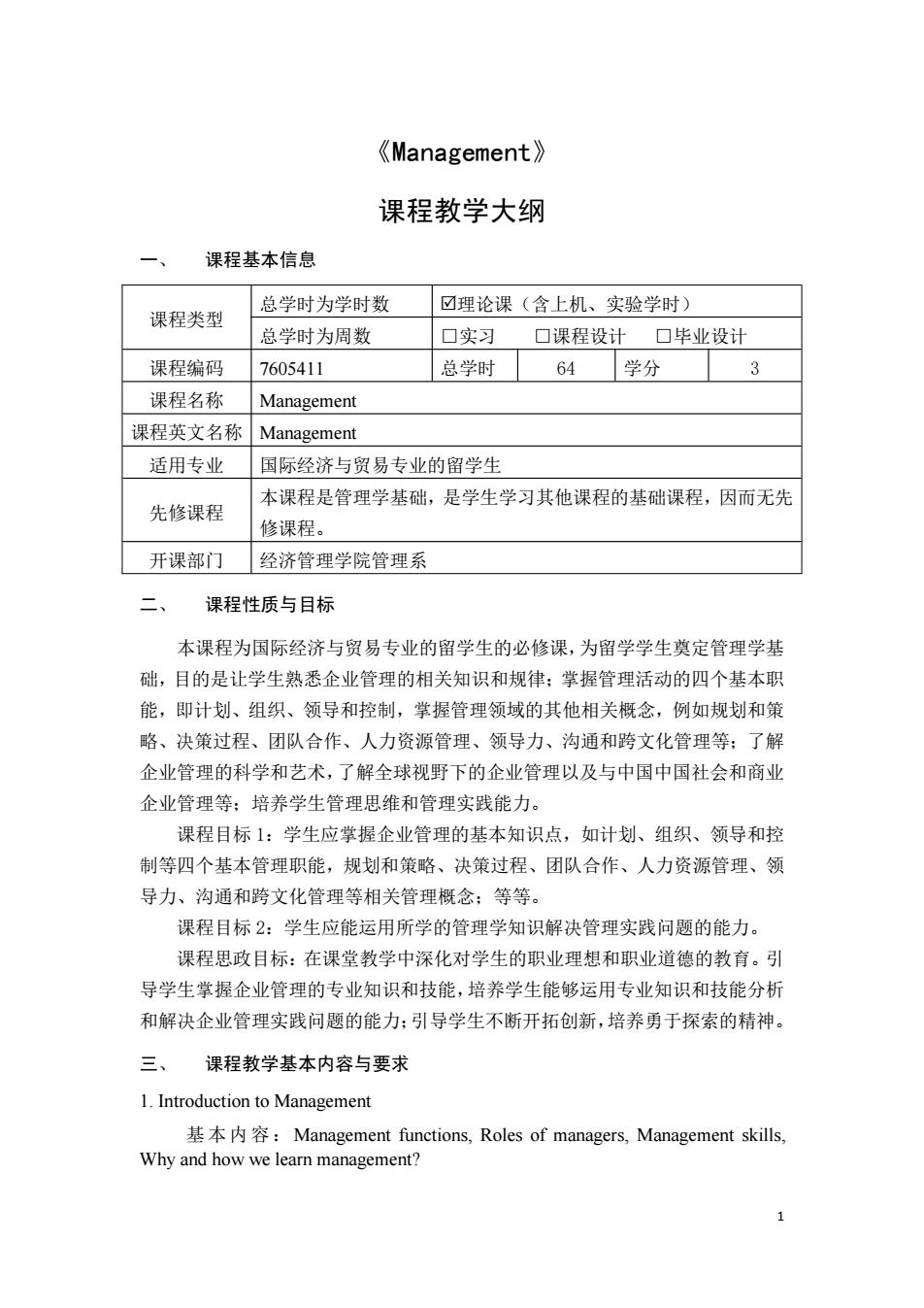
《Management》 课程教学大纲 课程基本信息 总学时为学时数 课程类型 ☑理论课(含上机、实验学时) 总学时为周数 口实习口课程设计口毕业设计 课程编码 7605411 总学时64学分 3 课程名称 Management 课程英文名称Management 适用专业 国际经济与贸易专业的留学生 先修课程 本课程是管理学基础,是学生学习其他课程的基础课程,因而无先 修课程。 开课部门经济管理学院管理系 课程性质与目标 本课程为国际经济与贸易专业的留学生的必修课,为留学学生奠定管理学基 础,目的是让学生熟悉企业管理的相关知识和规律:掌握管理活动的四个基本职 能,即计划、组织、领导和控制,掌握管理领域的其他相关概念,例如规划和策 略、决策过程、团队合作、人力资源管理、领导力、沟通和跨文化管理等:了解 企业管理的科学和艺术,了解全球视野下的企业管理以及与中国中国社会和商业 企业管理等:培养学生管理思维和管理实践能力。 课程目标1:学生应掌握企业管理的基本知识点,如计划、组织、领导和控 制等四个基本管理职能,规划和策略、决策过程、团队合作、人力资源管理、领 导力、沟通和跨文化管理等相关管理概念;等等。 课程目标2:学生应能运用所学的管理学知识解决管理实践问题的能力。 课程思政目标:在课堂教学中深化对学生的职业理想和职业道德的教育。引 导学生学握企业管理的专业知识和技能,培养学生能够运用专业知识和技能分析 和解决企业管理实践问题的能力:引导学生不断开拓创新,培养勇于探索的精神。 三、 课程教学基本内容与要求 1.Introduction to Management 基本内容:Management functions,Roles of managers,Management skills.. Why and how we learn management?
1 《Management》 课程教学大纲 一、 课程基本信息 课程类型 总学时为学时数 理论课(含上机、实验学时) 总学时为周数 □实习 □课程设计 □毕业设计 课程编码 7605411 总学时 64 学分 3 课程名称 Management 课程英文名称 Management 适用专业 国际经济与贸易专业的留学生 先修课程 本课程是管理学基础,是学生学习其他课程的基础课程,因而无先 修课程。 开课部门 经济管理学院管理系 二、 课程性质与目标 本课程为国际经济与贸易专业的留学生的必修课,为留学学生奠定管理学基 础,目的是让学生熟悉企业管理的相关知识和规律;掌握管理活动的四个基本职 能,即计划、组织、领导和控制,掌握管理领域的其他相关概念,例如规划和策 略、决策过程、团队合作、人力资源管理、领导力、沟通和跨文化管理等;了解 企业管理的科学和艺术,了解全球视野下的企业管理以及与中国中国社会和商业 企业管理等;培养学生管理思维和管理实践能力。 课程目标 1:学生应掌握企业管理的基本知识点,如计划、组织、领导和控 制等四个基本管理职能,规划和策略、决策过程、团队合作、人力资源管理、领 导力、沟通和跨文化管理等相关管理概念;等等。 课程目标 2:学生应能运用所学的管理学知识解决管理实践问题的能力。 课程思政目标:在课堂教学中深化对学生的职业理想和职业道德的教育。引 导学生掌握企业管理的专业知识和技能,培养学生能够运用专业知识和技能分析 和解决企业管理实践问题的能力;引导学生不断开拓创新,培养勇于探索的精神。 三、 课程教学基本内容与要求 1. Introduction to Management 基本内容:Management functions, Roles of managers, Management skills, Why and how we learn management?
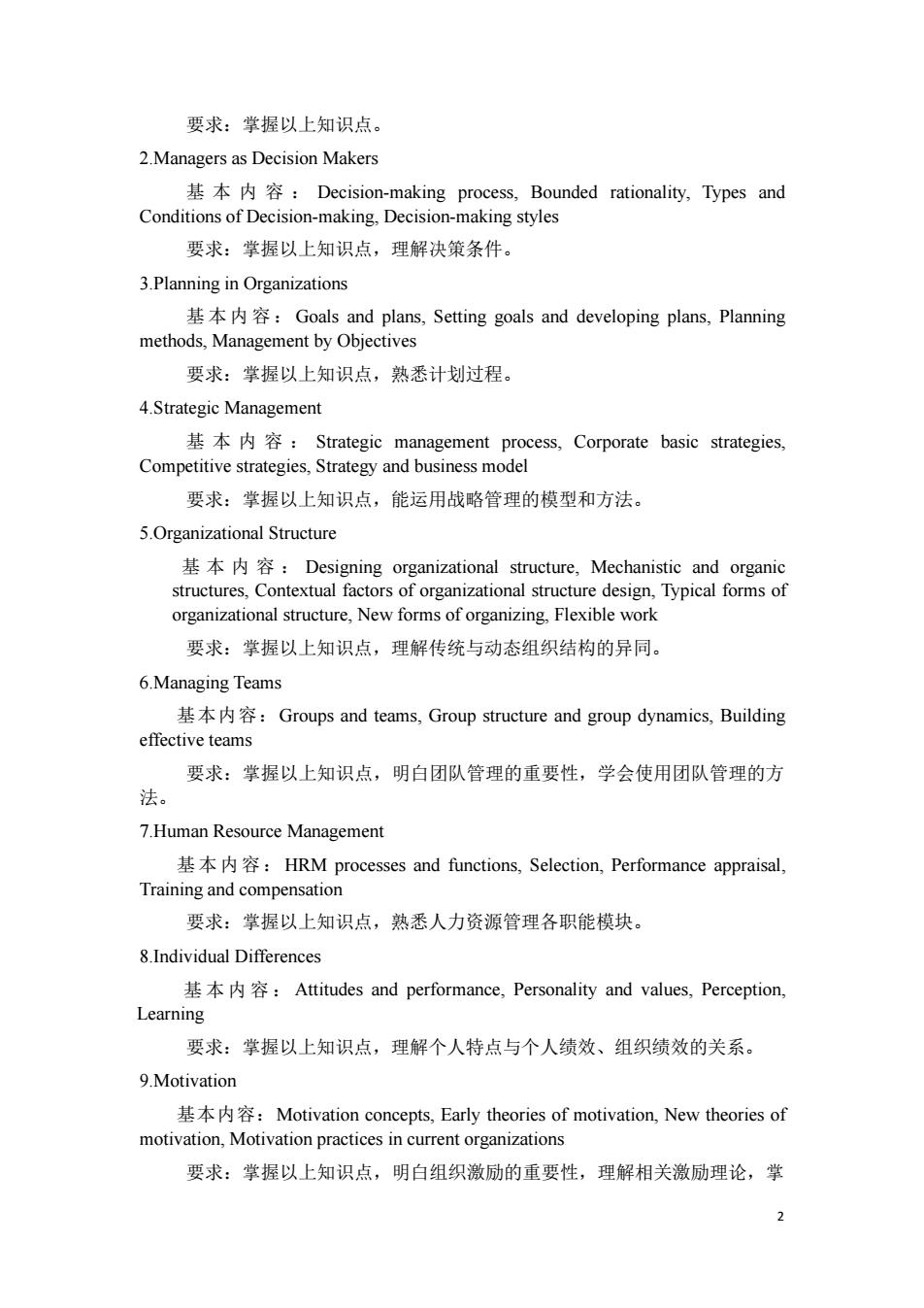
要求:掌握以上知识点。 2.Managers as Decision Makers ,基本内容:Decision-making process,Bounded rainality,Types and Conditions of Decision-making.Decision-making styles 要求:学握以上知识点,理解决策条件。 3.Planning in Organizations 基本内容:Goals and plans,Setting goals and developing plans,.Planning methods,Management by Objectives 要求:掌握以上知识点,熟悉计划过程。 4.Strategic Management 基本内容:Strategic management process,Corporate basic strategies, Competitive strategies,Strategy and business model 要求:掌握以上知识点,能运用战略管理的模型和方法。 5.Organizational Structure 基本内容:Designing organizational structure,.Mechanistic and organic 要求:掌握以上知识点,理解传统与动态组织结构的异同 6.Managing Teams 基本内容:Groups and teams,Group structure and group dynamics,.Building effective teams 要求:掌握以上知识点,明白团队管理的重要性,学会使用团队管理的方 法。 7.Human Resource Management 基本内容:HRM processes and functions,.Selection,Performance appraisal, Training and compensation 要求:掌握以上知识点,熟悉人力资源管理各职能模块。 8.Individual Differences 基本内容:Attitudes and performance,Personality and values,Perception, Learning 要求:掌握以上知识点,理解个人特点与个人绩效、组织绩效的关系。 9.Motivation 基本内容:Motivation concepts,.Early theories of motivation,New theories of motivation,Motivation practices in current organizations 要求:掌握以上知识点,明白组织激励的重要性,理解相关激励理论,掌
2 要求:掌握以上知识点。 2.Managers as Decision Makers 基 本 内 容 : Decision-making process, Bounded rationality, Types and Conditions of Decision-making, Decision-making styles 要求:掌握以上知识点,理解决策条件。 3.Planning in Organizations 基 本 内 容 : Goals and plans, Setting goals and developing plans, Planning methods, Management by Objectives 要求:掌握以上知识点,熟悉计划过程。 4.Strategic Management 基 本 内 容 : Strategic management process, Corporate basic strategies, Competitive strategies, Strategy and business model 要求:掌握以上知识点,能运用战略管理的模型和方法。 5.Organizational Structure 基 本 内 容 : Designing organizational structure, Mechanistic and organic structures, Contextual factors of organizational structure design, Typical forms of organizational structure, New forms of organizing, Flexible work 要求:掌握以上知识点,理解传统与动态组织结构的异同。 6.Managing Teams 基本内容:Groups and teams, Group structure and group dynamics, Building effective teams 要求:掌握以上知识点,明白团队管理的重要性,学会使用团队管理的方 法。 7.Human Resource Management 基本内容:HRM processes and functions, Selection, Performance appraisal, Training and compensation 要求:掌握以上知识点,熟悉人力资源管理各职能模块。 8.Individual Differences 基 本 内 容 : Attitudes and performance, Personality and values, Perception, Learning 要求:掌握以上知识点,理解个人特点与个人绩效、组织绩效的关系。 9.Motivation 基本内容:Motivation concepts, Early theories of motivation, New theories of motivation, Motivation practices in current organizations 要求:掌握以上知识点,明白组织激励的重要性,理解相关激励理论,掌
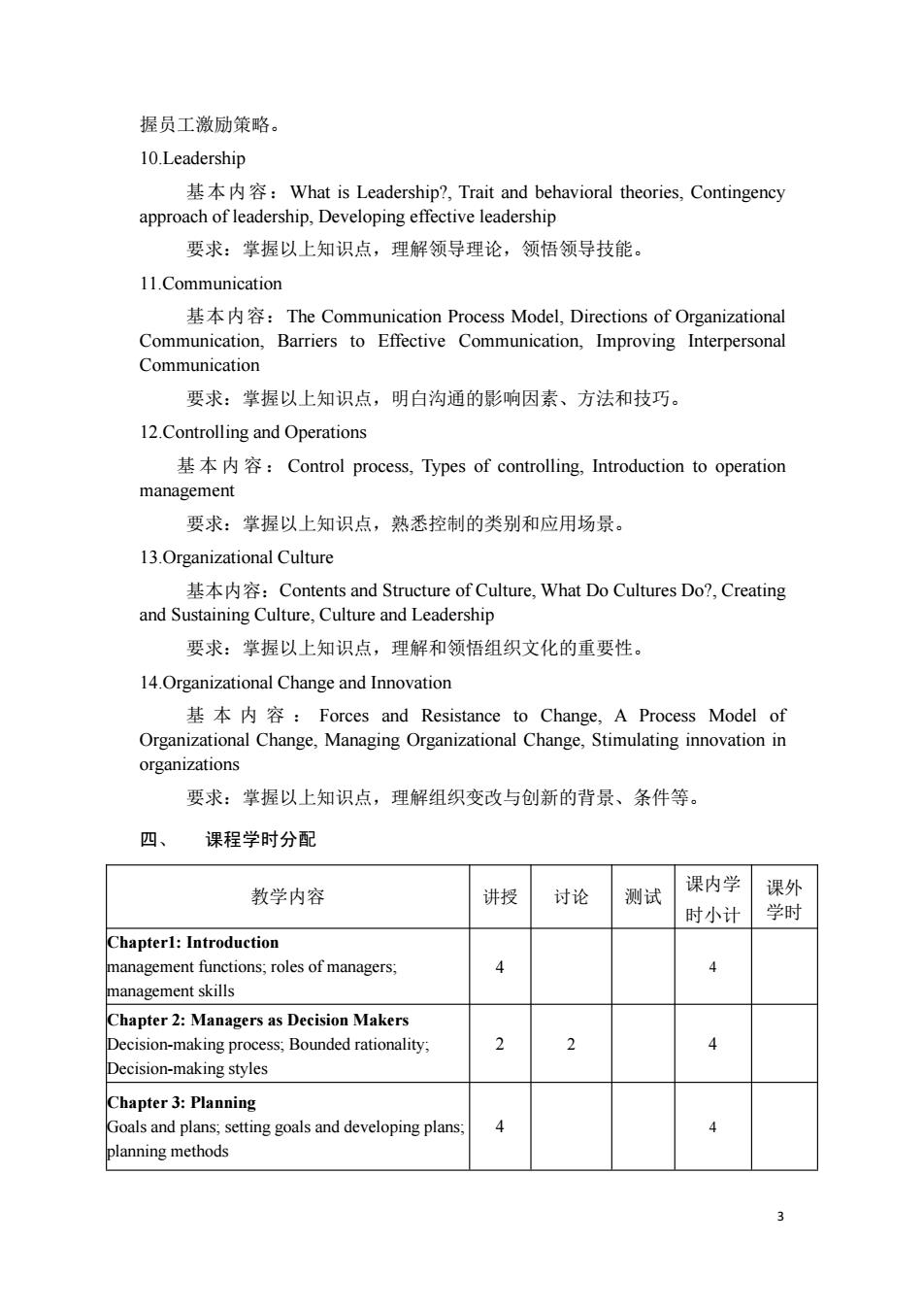
握员工激励策略。 10.Leadership 基本内容:What is Leadership?,Trait and behavioral theories,.Contingency approach of leadership.Developing effective leadership 要求:学握以上知识点,理解领导理论,领悟领导技能。 11.Communication 基本内容:The Communication Process Model,Directions of Organizational Communication,Barriers to Effective Communication,Improving Interpersona Communication 要求:掌握以上知识点,明白沟通的影响因素、方法和技巧。 12.Controlling and Operations 基本内容:Control process,.Types of controlling,Introduction to operation management 要求:掌握以上知识点,熟悉控制的类别和应用场景。 13.Organizational Culture 基本内容:Contents and Structure of Culture,.What Do Cultures Do?,Creating and Sustaining Culture,Culture and Leadership 要求:学握以上知识点,理解和领悟组织文化的重要性。 14.Organizational Change and Innovation 基本内容:Forces and Resistance to Change,.A Process Model of Organizational Change,Managing Organizational Change,Stimulating innovation in organizations 要求:掌握以上知识点,理解组织变改与创新的背景、条件等。 四、 课程学时分配 教学内容 讲授 讨论 测试 课内学 课外 时小计 学 Chapterl:Introduction management functions;roles of managers; 4 management skills Chapter 2:Managers as Decision Makers Decision-making process:Bounded rationality 2 Decision-making stvles Chapter 3:Planning oas and plans.setting goalsand developing plans 4 planning methods
3 握员工激励策略。 10.Leadership 基本内容:What is Leadership?, Trait and behavioral theories, Contingency approach of leadership, Developing effective leadership 要求:掌握以上知识点,理解领导理论,领悟领导技能。 11.Communication 基本内容:The Communication Process Model, Directions of Organizational Communication, Barriers to Effective Communication, Improving Interpersonal Communication 要求:掌握以上知识点,明白沟通的影响因素、方法和技巧。 12.Controlling and Operations 基 本 内 容 : Control process, Types of controlling, Introduction to operation management 要求:掌握以上知识点,熟悉控制的类别和应用场景。 13.Organizational Culture 基本内容:Contents and Structure of Culture, What Do Cultures Do?, Creating and Sustaining Culture, Culture and Leadership 要求:掌握以上知识点,理解和领悟组织文化的重要性。 14.Organizational Change and Innovation 基 本 内 容 : Forces and Resistance to Change, A Process Model of Organizational Change, Managing Organizational Change, Stimulating innovation in organizations 要求:掌握以上知识点,理解组织变改与创新的背景、条件等。 四、 课程学时分配 教学内容 讲授 讨论 测试 课内学 时小计 课外 学时 Chapter1: Introduction management functions; roles of managers; management skills 4 4 Chapter 2: Managers as Decision Makers Decision-making process; Bounded rationality; Decision-making styles 2 2 4 Chapter 3: Planning Goals and plans; setting goals and developing plans; planning methods 4 4
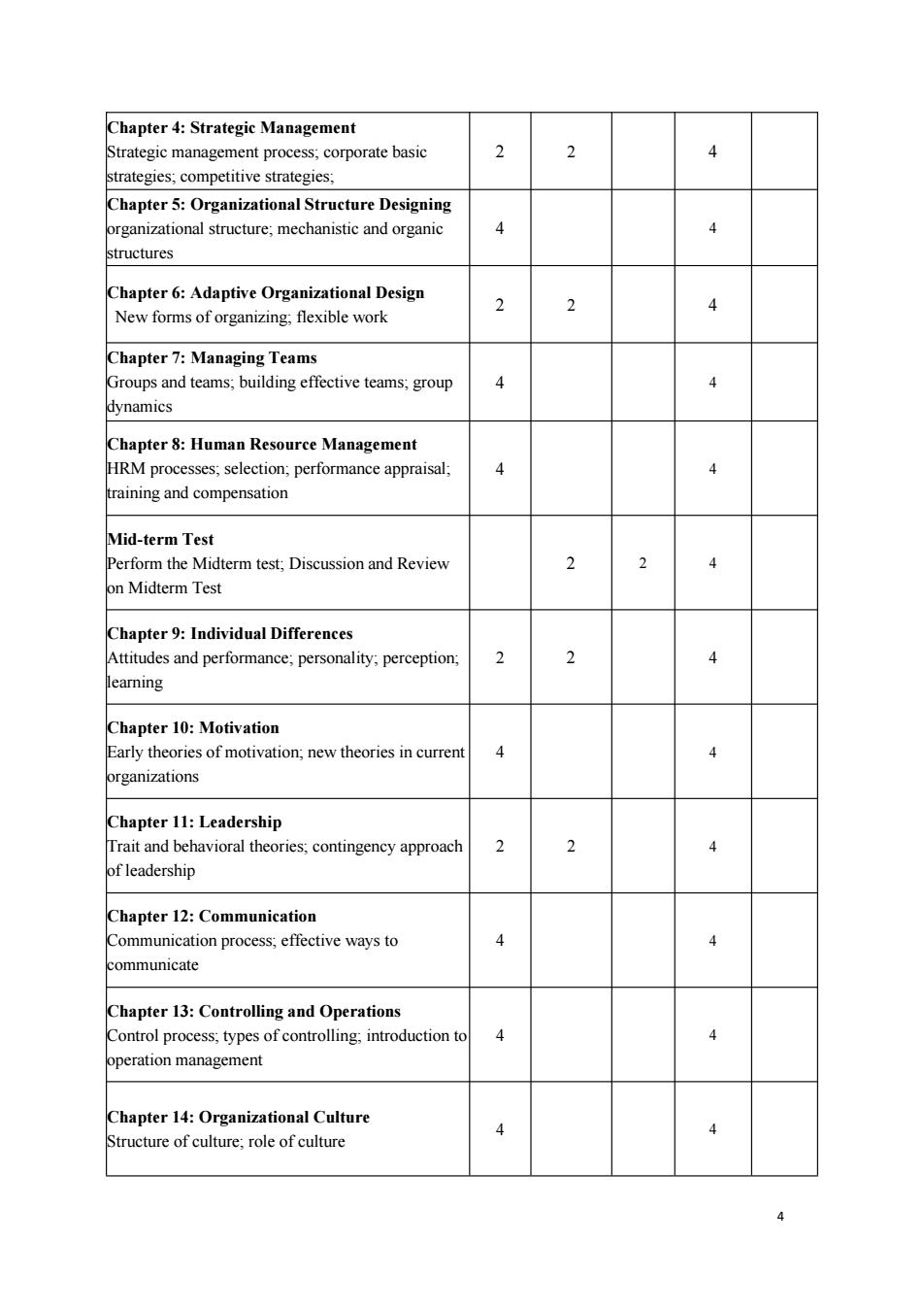
Chapter 4:Strategic Management Strategic management process,corporate basic 2 strategies:competitive strategies. Chapter 5:Organizational Structure Designing tional structure,mechanistic and organic structures Chapter 6:Adaptive Organizational Design New forms of organizing lexible work Chapter 7:Managing Teams and teams uilding effective teams group dynamic Chapter 8:Human Resource Management HRM processes,selection,performance appraisal training and compensation Mid-term Test Perform the Midterm test:Discussion and Review 4 on Midterm Test Chapter 9:Individual differences Attitudes and performance:personality.perception 2 Chapter 10:Motivation Early theories of motivation:new theories in current A organizations Chapter 11:Leadership Trait and behavioral theories contingency approach 2 2 Chapter 12:Communication Communication process:effective ways to 4 communicate Chapter 13:Controlling and Operations Control process,types of introduction to 4 operation management Chapter 14:Organizational Culture Structure of culture;role of culture 4
4 Chapter 4: Strategic Management Strategic management process; corporate basic strategies; competitive strategies; 2 2 4 Chapter 5: Organizational Structure Designing organizational structure; mechanistic and organic structures 4 4 Chapter 6: Adaptive Organizational Design New forms of organizing; flexible work 2 2 4 Chapter 7: Managing Teams Groups and teams; building effective teams; group dynamics 4 4 Chapter 8: Human Resource Management HRM processes; selection; performance appraisal; training and compensation 4 4 Mid-term Test Perform the Midterm test; Discussion and Review on Midterm Test 2 2 4 Chapter 9: Individual Differences Attitudes and performance; personality; perception; learning 2 2 4 Chapter 10: Motivation Early theories of motivation; new theories in current organizations 4 4 Chapter 11: Leadership Trait and behavioral theories; contingency approach of leadership 2 2 4 Chapter 12: Communication Communication process; effective ways to communicate 4 4 Chapter 13: Controlling and Operations Control process; types of controlling; introduction to operation management 4 4 Chapter 14: Organizational Culture Structure of culture; role of culture 4 4
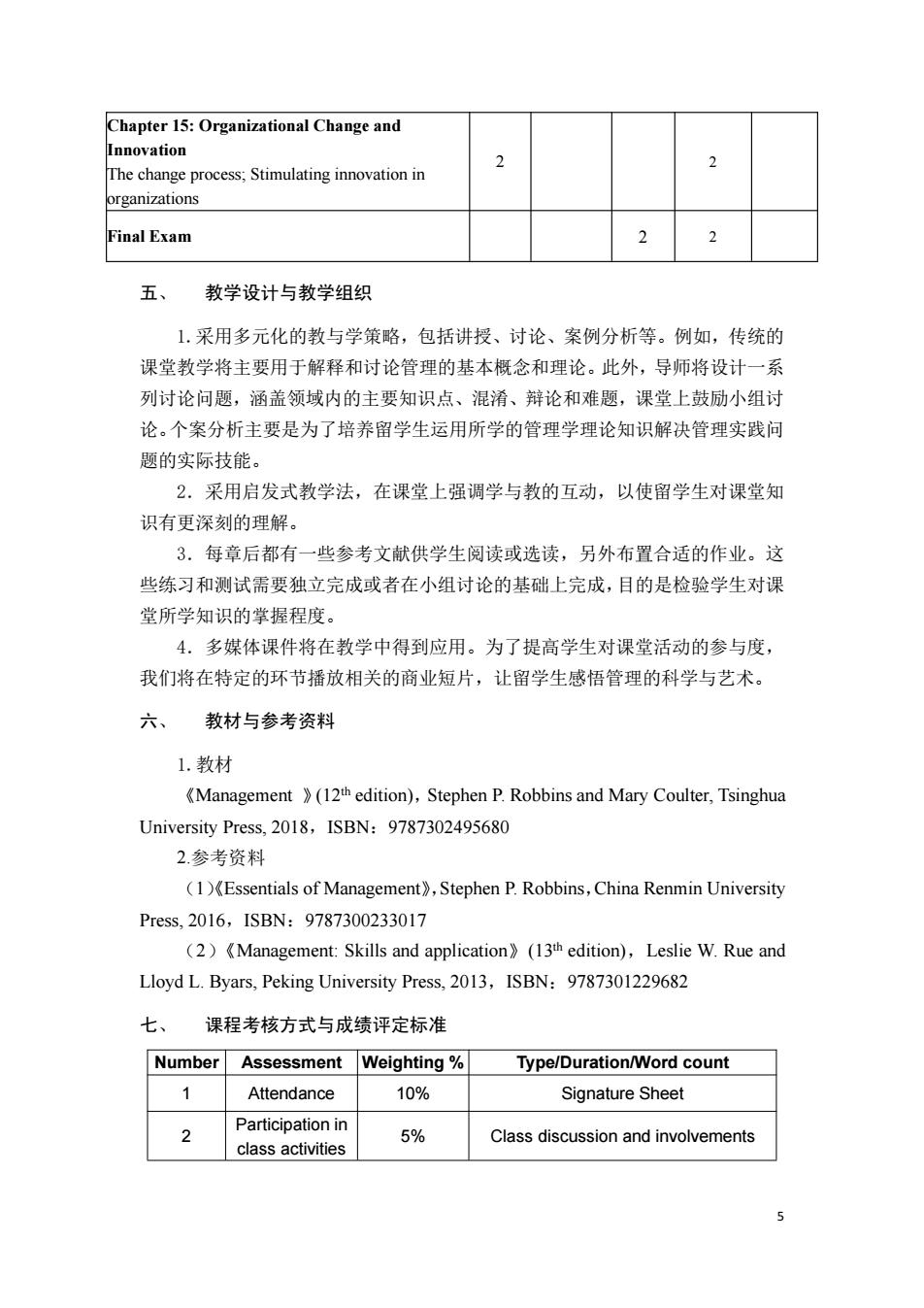
Chapter 15:Organizational Change and ation The change process Stimulating innovation in organizations Final Exam 五、 教学设计与教学组织 1.采用多元化的教与学策略,包括讲授、讨论、案例分析等。例如,传统的 课堂教学将主要用于解释和讨论管理的基本概念和理论。此外,导师将设计一系 列讨论问题,涵盖领域内的主要知识点、混淆、辩论和难题,课堂上鼓励小组讨 论。个案分析主要是为了培养留学生运用所学的管理学理论知识解决管理实践问 题的实际技能。 2.采用启发式教学法,在课堂上强调学与教的互动,以使留学生对课堂知 识有更深刻的理解。 3.每章后都有一些参考文献供学生阅读或选读,另外布置合适的作业。这 些练习和测试需要独立完成或者在小组讨论的基础上完成,目的是检验学生对课 堂所学知识的掌握程度。 4.多媒体课件将在教学中得到应用。为了提高学生对课堂活动的参与度, 我们将在特定的环节播放相关的商业短片,让留学生感悟管理的科学与艺术。 六、教材与参考资料 1.教材 (Management(12th edition),Stephen P.Robbins and Mary Coulter,Tsinghua University Press,2018,ISBN:9787302495680 2.参考资料 (1)(Essentials of Management),Stephen P.Robbins,China Renmin University Press,2016,1SBN:9787300233017 (2)(Management:Skills and application(13h edition),Leslie W.Rue and Lloyd L.Byars,Peking University Press,2013,ISBN:9787301229682 七、 课程考核方式与成绩评定标准 Number Assessment Weighting% Type/Duration/Word count 1 Attendance 10% Signature Sheet Participation in ass activities 5% Class discussion and involvements
5 Chapter 15: Organizational Change and Innovation The change process; Stimulating innovation in organizations 2 2 Final Exam 2 2 五、 教学设计与教学组织 1.采用多元化的教与学策略,包括讲授、讨论、案例分析等。例如,传统的 课堂教学将主要用于解释和讨论管理的基本概念和理论。此外,导师将设计一系 列讨论问题,涵盖领域内的主要知识点、混淆、辩论和难题,课堂上鼓励小组讨 论。个案分析主要是为了培养留学生运用所学的管理学理论知识解决管理实践问 题的实际技能。 2.采用启发式教学法,在课堂上强调学与教的互动,以使留学生对课堂知 识有更深刻的理解。 3.每章后都有一些参考文献供学生阅读或选读,另外布置合适的作业。这 些练习和测试需要独立完成或者在小组讨论的基础上完成,目的是检验学生对课 堂所学知识的掌握程度。 4.多媒体课件将在教学中得到应用。为了提高学生对课堂活动的参与度, 我们将在特定的环节播放相关的商业短片,让留学生感悟管理的科学与艺术。 六、 教材与参考资料 1.教材 《Management 》(12 th edition),Stephen P. Robbins and Mary Coulter, Tsinghua University Press, 2018,ISBN:9787302495680 2.参考资料 (1)《Essentials of Management》,Stephen P. Robbins,China Renmin University Press, 2016,ISBN:9787300233017 (2)《Management: Skills and application》(13 th edition),Leslie W. Rue and Lloyd L. Byars, Peking University Press, 2013,ISBN:9787301229682 七、 课程考核方式与成绩评定标准 Number Assessment Weighting % Type/Duration/Word count 1 Attendance 10% Signature Sheet 2 Participation in class activities 5% Class discussion and involvements
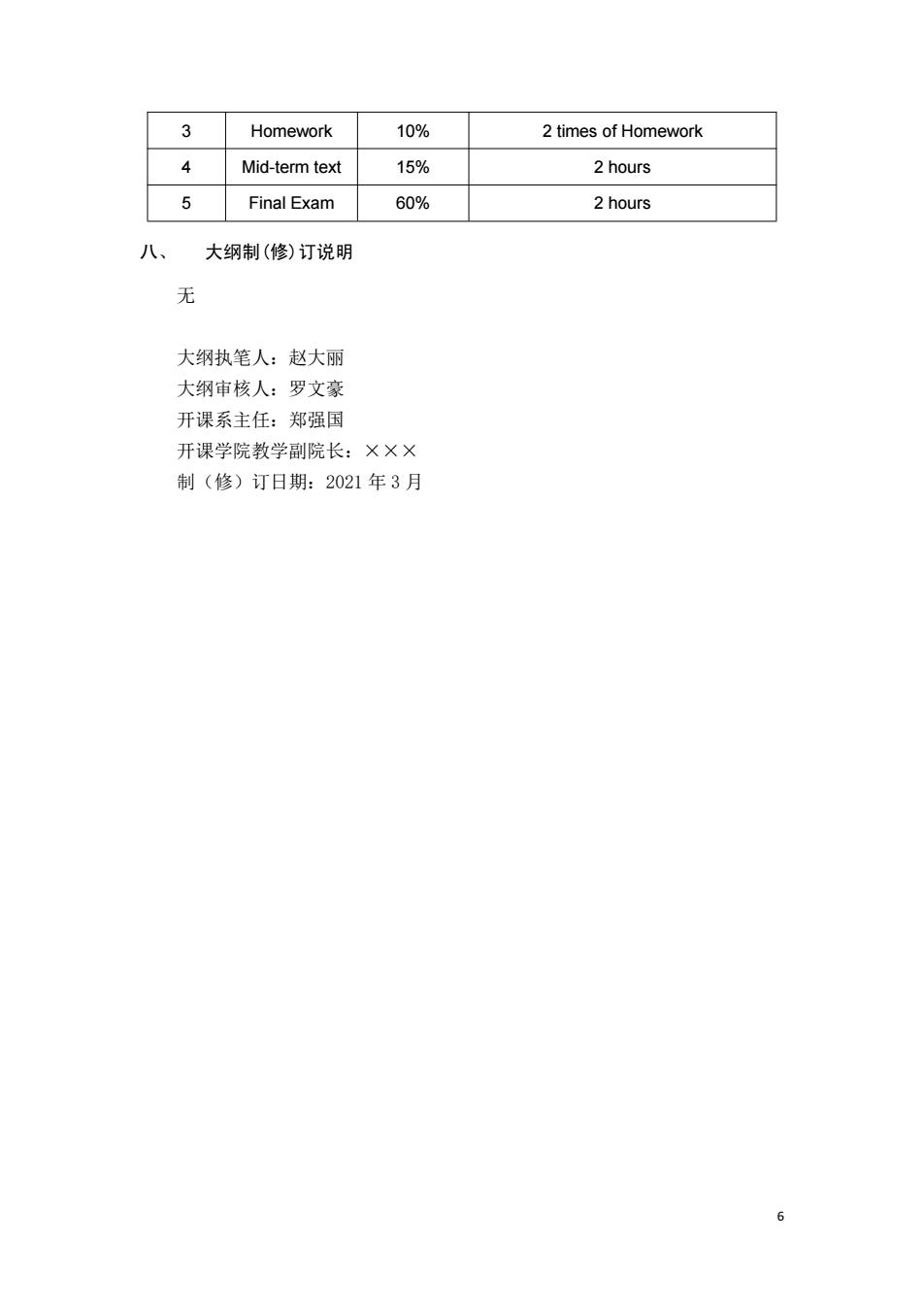
3 Homework 10% 2 times of Homework 4 Mid-term text 15% 2 hours 5 Final Exam 60% 2 hours 八、 大纲制(修)订说明 大纲执笔人:赵大丽 大纲审核人:罗文豪 开课系主任:郑强国 开课学院教学副院长:××× 制(修)订日期:2021年3月 6
6 3 Homework 10% 2 times of Homework 4 Mid-term text 15% 2 hours 5 Final Exam 60% 2 hours 八、 大纲制(修)订说明 无 大纲执笔人:赵大丽 大纲审核人:罗文豪 开课系主任:郑强国 开课学院教学副院长:××× 制(修)订日期:2021 年 3 月

y
1